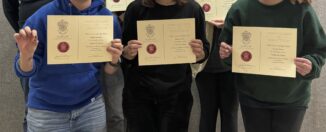Graduate-Level Preparation with the Research Club
By Paige Uzzell
The Research club, run by Erin Rowland, Alison Coomer, and Dylan DuRee, is here to help students expand their knowledge in the field of research, especially preparing them to continue their studies in graduate school.
Many graduate schools require research experience as an undergraduate in order to apply for certain programs. This is especially prevalent in the different scientific fields.
“We hope to provide an environment where students can develop independent projects and learn about what it is actually like working in a research environment,” Research Club officer Erin Rowland said.
The club began this semester with an introduction as to what research even is. This allowed students to start a foundation on which to build the rest of their work.
“Since this club is open to any major, we thought (it would be important to have) an introduction to what research kind of looks like, and what C. elegans actually are, since they are not a common species the we focus on here at Concordia. We introduced the idea of research and working in the lab with having the members make their own plates of C. elegans. They really enjoyed getting hands-on with the project and using the microscopes, (because) for some it was their first time using a microscope,” Research Club officer, Alison Coomer said.
The club is open to every major, but right now it has more applications for science majors. There is hope that in the years to come the research club will have more opportunities for different majors.
“This semester, we only had research project opportunities for science majors,” Rowland said. “Our hope is to be able to open the club up to researchers from any field going forward. There’s plenty of room for history, psychology, geography, and any other field of research. While there are differences in the way research is done across these fields, we think that there’s enough common ground for us to meet together.”
Research Club has been able to help open the doors for students interested in the research fields. The club also has already been helpful for students of every major at Concordia.
“This club has been a joy for the students who are in it. Not only is it getting more people interested in the research field, but it has also opened the doors for non-science majors to participate and learn more about the sciences,” Coomer said. “It also offers them experiences they would not normally have experienced in their own program. This club also offers lab techniques that will be beneficial for most of the members to use in their current and future classes here at Concordia and in their future jobs. Another benefit of this club is getting to see first hand how much work goes into research.”
The students have started the school year off by studying C. elegans and plan to spend next semester studying zebrafish.
“We worked towards establishing a project studying C. elegans, which are a species of nematode. They’re a pretty common research subject that can be used to study environmental impacts on things like metabolism, behavior, and lifespan,” Rowland said. “We’re also setting up for next semester’s projects, which will include work with zebrafish. Zebrafish are being used in a lot of major research right now, including cancer research.”
The aim of the Research Club is to help the students of Concordia succeed in research, both in graduate school and career settings.
“Our ultimate goal is for the research club to be an interdisciplinary club that supports all students who are interested in research,” Rowland said. “ I’d like to see the club help support students in other aspects of career preparation as well, such as journal clubs, help with applications, and discussions about topics like research ethics.”














